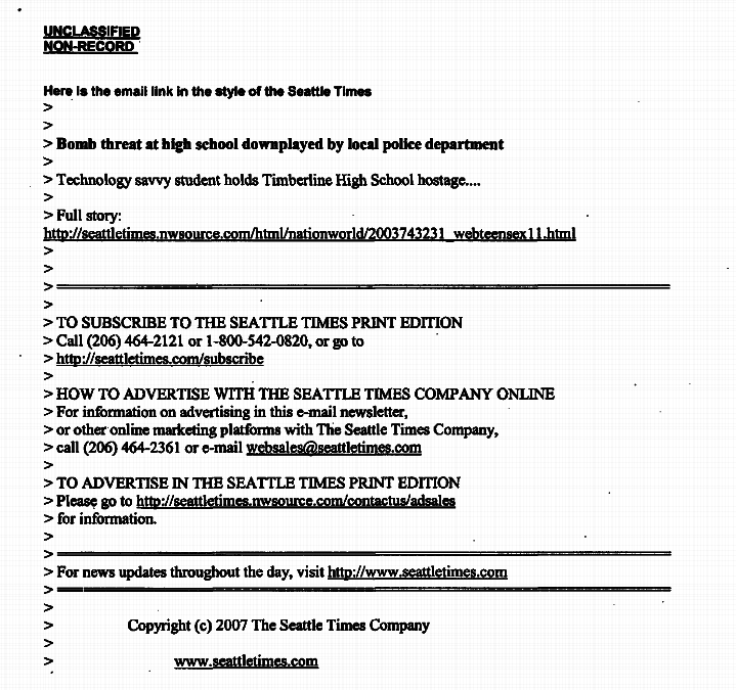FBI Impersonated Seattle Times To Spy On Bomb-Threat Suspect

The Seattle Times is furious with the FBI after it emerged that the bureau impersonated Times journalists to install spyware on a 15-year-old bomb threat suspect. The disclosure is the latest example of a law enforcement agency masquerading itself online to dupe people into providing information.
The investigative technique was first revealed Monday by American Civil Liberties Union researcher Christopher Soghoian, who discovered that agents at the Federal Bureau of Investigation sent the teenager an email that appeared to be from the Seattle Times. The message contained a link that, once clicked, installed software that allowed the FBI to pinpoint the computer’s location, IP address, a list of running programs, the language used and the currently logged-in user. Known as a “phishing” attack, the technique is the same kind of hack frequently used by cyberthieves.
Soghoian’s discovery sheds new light on the 2007 arrest and conviction of the youth, then 15, infuriating staff at the Seattle Times who now say sources have reason to doubt the legitimacy of an email from the newspaper. It also comes barely more than a week after Facebook issued a letter condemning the U.S. Drug Enforcement Administration for impersonating a female user in an attempt to communicate with her friends. DEA activity, which the U.S. Justice Department defended in court, included posting racy photos of the woman.
Ryan Calo, a professor at the University of Washington School of Law, said the online stratagems are reminiscent of more commonly accepted police tactics - - like a detective lying to a suspect during a murder investigation or posing as a fictional child online to nab sexual predators - - but in this case they go too far.
“It’s very common for law enforcement to work with informants, use deceptions in order to catch criminals but there’s a difference between misrepresenting something about the world and taking over a real person’s identity,” he said.
“This is a bridge too far because now what happens is that you create doubt in the citizenry. At minimum it’s unethical and I think this certainly infringes on the privacy rights of the Seattle Times.”
The Seattle Times agreed, with editor Kathy Best explaining to the Stranger, Seattle’s alternative weekly newspaper, that the FBI’s impersonation not only crosses a line, “it erases it.” Soghoian similarly compared the bureau’s tactics to CIA intelligence-gathering operations disguised as immunization programs carried out in Pakistan in 2011 to catch Osama bin Laden, a campaign that the agency later promised not to replicate.
“We hope that this mistake in judgment by the FBI was a one-time aberration and not a symptom of a deeper lack of respect for the role of free press in society,” Best said.
An FBI spokesman has defended the tactic, telling the Stranger that the bureau “identified a specific subject of an investigation and used a technique that we deemed would be effective in preventing a possible act of violence in a school setting.”
Media observers have suggested that the technique is a sign of things to come, a theory heightened by concerns over wide-ranging subpoenas against the Associated Press and ongoing litigation against prominent reporters. Law enforcement officials posing as journalists could also give credence to claims that news agencies are too lenient on the government, or even put journalists at risk. That’s not to mention that journalists can't effectively do their job if they lose the audience's trust.
“The chilling effect on readership is very damaging,” said Geoffrey King, the Internet Advocacy Coordinator for the Committee to Protect Journalists. “I don’t think this is an isolated problem. The bureau is making it possible for people to wonder if journalists are agents of the state and thus dis-incentivizing people to read the news.”
© Copyright IBTimes 2024. All rights reserved.











